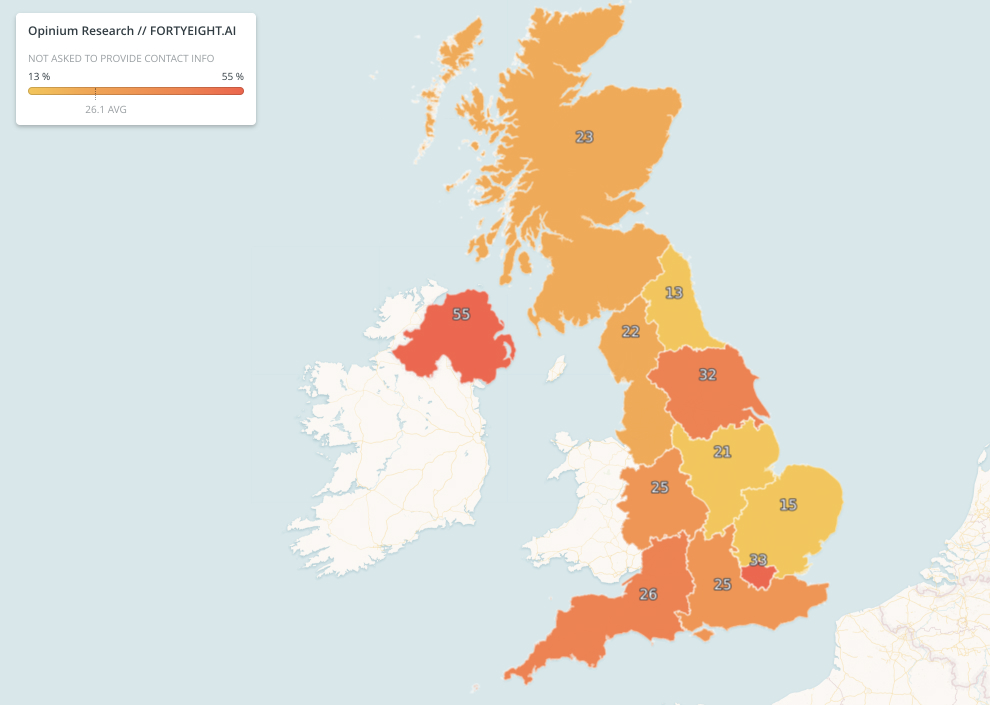Should I stay (in) or should I go (out)?
It’s July 2020, and as lockdown eased people flocked to pubs, bars, restaurants and cafés to enjoy some rest and relaxation together. Or so we assumed.
According to a new survey commissioned by FORTYEIGHT.AI in July 2020, since reopening, two-thirds of people have not yet visited and been served in pubs, bars, restaurants and cafés in the UK (65%), they say this is because they are worried about social distancing rules not being followed (38%); and this is higher among those living in the North West of England (43%), and those aged 55 and over people (44%) compared to under 35s (34%).
Conversely, the third of people (35%) that have been out were more likely to be 18-34s (47%) compared to people aged 55 and over (26%)
Two-thirds of consumers have not yet visited and been served in pubs, bars, restaurants and cafés in the UK (65%)
Trust issues
People haven’t visited and been served inside pubs, bars, restaurants or cafes since they reopened because they don’t trust others to follow social distancing rules in public places (38%); they are worried about getting Covid-19 from others (37%); and they don’t trust the government’s advice (21%).
These behaviours are fairly consistent across all age groups and genders, although those aged 55 and over people are more likely to not trust others to follow social distancing rules in public places (44% among those aged 55+, 34% among those aged 35-54 and 18-34).
Distrust of others not following the rules is highest among people in the North West (43%), whereas a fear of contamination from others is highest among those in the South West (45%). Distrust of the government’s advice is highest in London (31%).
“By combining technology with consumer insight, we hope to build trust and confidence in the UK’s COVID-19 contact tracing efforts, bridging the gap between public and private sector, and helping to rebuild the economy.”
Aware of the rules
The fear about going to establishments is noticeable when you consider that nearly three quarters of people (72%), and especially those in the North East (84%), are aware that the government announced that all pubs, bars, restaurants or cafés must collect and maintain contact records. Indeed, only 21% are unaware and 7% are unsure about these government guidelines. People who are most unaware and unsure about the rules reside in Northern Ireland (40% and 13% respectively).
Understandably, with potentially more health risk awareness, people aged 55 and over are more aware of these rules (78%) compared to under 35s (63%). Parents are also more aware (75%) versus non-parents (67%), as are those who have visited and been served (82%).
Personal safety is the primary reason given by people who would provide contact information (48%)

Being safe and trusted
While people would provide contact information for a range of reasons, there are two dominant mindsets behind why people would do this.
First and foremost, personal safety is the primary reason given by people who would provide contact information, with people wanting to be safe (48%) and ease concerns they have about a potential second spike (40%).
This mindset of personal safety exists is more common among women (54%) and 55 and overs (51%), and those who haven’t been to an establishment yet (49%), and reflects a growing need for greater trust and confidence among people. Personal safety reasons are also highest in the West Midlands (52%) and the East of England (54%).
Personal reputation is the secondary reason for providing contact information, with 47% saying they would do so to follow the rules, ensure others are safe (46%), be seen as a responsible person (37%), do what is socially acceptable (30%) and be trusted by other people and establishments (15%). This mindset also exists more common among women aged 55 and over.
People in the West Midlands (54%) and the South East (53%) are most likely to do so to follow the rules, whereas people in Northern Ireland are most likely to do so to be seen as a responsible person (50%).
Methodology
This report was written by Avansere AS, and the research was conducted by Opinium Research. 1,908 adults England, Scotland and Northern Ireland were surveyed between 17/07/20 and 20/07/20. The data was weighted to be nationally representative.
For press and media enquiries, please take a look at our Press & Media page, or for more general information on this research and our products, please contact the team on hello@fortyeight.ai





